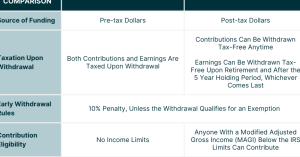Move Your 401k to Gold IRA Without Penalty Guide 2023
Summary
- A Gold IRA allows you to diversify your retirement portfolio by investing in precious metals like gold, silver, platinum, and palladium.
- To move your 401k to a Gold IRA without penalties, research and choose a reputable custodian bank, open a self-directed IRA account, complete necessary paperwork, and decide on investment options.
- There are two rollover options: direct and indirect. Direct rollovers transfer funds directly from your 401k to the Gold IRA custodian, while indirect rollovers involve receiving a distribution and depositing it into a Gold IRA within 60 days.
- When selecting a Gold IRA provider, consider security, fees, gold product selection, transparency in pricing, and customer service.
Welcome to the comprehensive guide on seamlessly transitioning your 401k to a Gold IRA without incurring any penalties. In this article, we will delve into the intricacies of this investment move, equipping you with the knowledge and insights needed to make informed decisions for a secure financial future. Join us as we explore the potential benefits and considerations involved in this exciting prospect.

Understanding Gold IRAs
Move your 401k to a Gold IRA without penalty by understanding the process and benefits. A Gold IRA allows you to diversify your retirement portfolio by investing in precious metals like gold, silver, platinum, and palladium. By moving your 401k into a Gold IRA, you can protect your savings from market volatility and inflation. Choose a reputable custodian bank to hold your precious metals and ensure the security of your investment. Conduct due diligence and research different gold IRA custodians to find one that meets your needs.
Consult with a financial advisor to assess the risks and advantages of investing in gold and determine if it aligns with your retirement goals. Avoid penalties and taxes by following the proper procedures and guidelines when transferring your 401k to a Gold IRA.
Steps to Convert 401(k) to a Self-Directed IRA
1. Research and choose a reputable custodian bank that allows self-directed IRAs.
2. Contact your current 401(k) provider and inform them of your intention to roll over the funds into an IRA.
3. Open a self-directed IRA account with the chosen custodian bank.
4. Complete the necessary paperwork to initiate the rollover process.
5. Decide on the investment options for your self-directed IRA, such as gold or other precious metals.
6. Work with a financial adviser if needed to ensure you make informed investment decisions.
7. Submit the completed paperwork to your 401(k) provider and initiate the rollover process.
8. Monitor the rollover process and ensure the funds are transferred to your self-directed IRA.
9. Once the funds are in your self-directed IRA, you can invest in gold or other approved assets.
10. Regularly review and manage your self-directed IRA to optimize your investment strategy and meet your financial goals.
Rollover Options: Direct vs. Indirect

When moving your 401k to a Gold IRA without penalty, you have two options: direct and indirect rollovers.
With a direct rollover, your funds are transferred directly from your 401k to the Gold IRA custodian, without you ever touching the money. This method ensures a smooth and seamless transition, while also avoiding any tax penalties or withholding.
On the other hand, an indirect rollover involves receiving a distribution from your 401k and then depositing it into a Gold IRA within 60 days. While this option provides more flexibility, it's crucial to follow the strict IRS rules to avoid penalties.
Ultimately, the choice between direct and indirect rollovers depends on your preferences and circumstances. Consult with a financial advisor to determine the best option for your specific needs.
Selecting a Gold IRA Provider
When selecting a Gold IRA provider, there are a few key factors to consider. First, ensure that the provider offers a secure and reliable platform to safeguard your investment. Look for a provider with a strong track record and positive customer reviews. Additionally, consider the fees associated with the account, including setup fees, storage fees, and transaction fees.
It's also important to evaluate the provider's selection of gold products and their transparency in pricing. Finally, review the provider's customer service and support options to ensure you'll have assistance when needed. Conduct thorough due diligence to choose the best Gold IRA provider for your financial goals.

Tax Considerations for Precious Metals IRAs
When considering a move from a 401k to a Gold IRA, it is important to understand the tax implications. By transferring your retirement funds into a Precious Metals IRA, you can potentially enjoy tax advantages and diversify your portfolio. Unlike traditional IRAs, Precious Metals IRAs allow you to invest in physical gold, silver, platinum, and palladium. This can act as a hedge against inflation and market volatility.
Storage Solutions: IRS-Compliant Custodians and Facilities

When moving your 401k to a Gold IRA, it's crucial to ensure your storage solutions are IRS-compliant. Finding the right custodians and facilities can help protect your investment and give you peace of mind. Look for trusted custodians who specialize in precious metals and offer secure storage options. Consider factors such as market liquidity and fees when choosing a custodian. Additionally, make sure the facilities have proper security measures in place to safeguard your gold. By selecting IRS-compliant storage solutions, you can confidently navigate the process of moving your 401k to a Gold IRA without penalty.
Navigating Retirement Account Contribution Limits
Navigating retirement account contribution limits can be a complex task, but with the right guidance, you can make the most of your savings. When considering a move from your 401(k) to a Gold IRA, it's important to understand the rules and regulations to avoid penalties. Consult with a financial adviser who specializes in retirement accounts and gold investments to ensure a smooth transition. Diversifying your portfolio with precious metals like gold can provide a hedge against inflation and market volatility.
Avoiding Penalties in Retirement Account Transfers
When moving your 401k to a Gold IRA, it's important to be aware of potential penalties. To avoid these penalties, follow these steps:
1. Research the specific rules and regulations surrounding retirement account transfers to ensure compliance.
2. Choose a reputable Gold IRA custodian that specializes in retirement account transfers to ensure a smooth and penalty-free process.
3. Consult with a financial advisor to understand the potential tax implications and advantages of transferring your retirement funds to a Gold IRA.
4. Be mindful of any fees associated with the transfer and consider the long-term benefits of diversifying your portfolio with precious metals.
By taking these precautions, you can confidently move your retirement funds to a Gold IRA without incurring any unnecessary penalties.
Comparing Gold IRAs with Traditional 401(k) Plans
| Criteria | Gold IRAs | Traditional 401(k) Plans |
|---|---|---|
| Tax Advantages | Offers tax advantages such as tax-free growth and tax-free withdrawals for qualified distributions. | Offers tax advantages such as tax-deferred growth, where contributions are made pre-tax, but withdrawals are taxed as ordinary income. |
| Investment Options | Allows investment in physical gold or other approved precious metals. | Typically offers a range of investment options including stocks, bonds, mutual funds, and ETFs. |
| Control | Investors have more control over their assets and can actively manage their gold investments. | Employer-sponsored plans limit investment choices and are managed by plan administrators. |
| Portability | Gold IRAs can be transferred or rolled over into another Gold IRA or traditional retirement account. | 401(k) plans can be rolled over into an Individual Retirement Account (IRA) or another employer's retirement plan. |
| Penalties | No penalties for qualified distributions after the age of 59 ½. | Early withdrawals before the age of 59 ½ may incur a 10% penalty in addition to income taxes. |
Gold IRA: Should You Open One To Save For Retirement?


